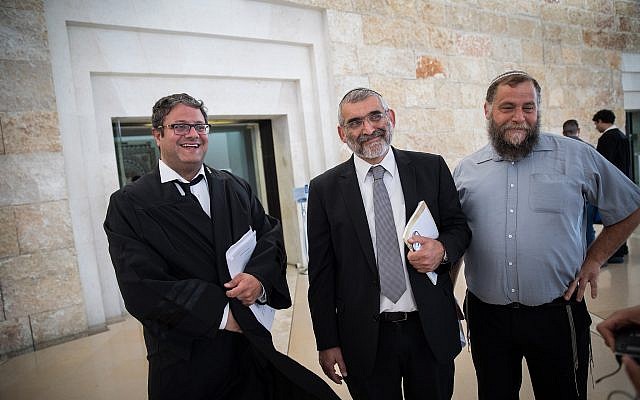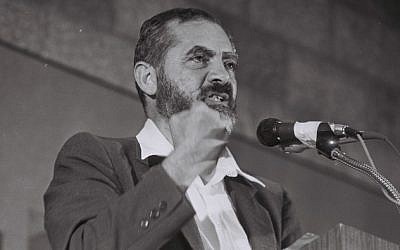With limited bargaining chips, far-right faction, composed of disciples of the late Rabbi Meir Kahane, agrees to slots 5 and 8 on national religious party’s slate

The extremist Otzma Yehudit faction said it accepted a compromise offer Wednesday morning to run on a joint ticket with the national religious Jewish Home party, in a move that would likely ensure the entrance of at least one lawmaker from the party of Meir Kahane disciples into the 21st Knesset.
After weeks of negotiations that extended to within a day of the deadline for parties to file their final slates for the April ballot, Otzma Yehudit (the party’s name translates as “Jewish power” or “Jewish might”) agreed to take the fifth and eighth spots in a united list with Jewish Home.
The offer was the same one that the party — led by former National Union MK Michael Ben Ari and activists Itamar Ben Gvir, Baruch Marzel and Bentzi Gopstein — had rejected the last time the sides sat down on Tuesday. But Otzma Yehudit has been consistently polling below the electoral threshold of 3.25 percent of the national vote and had made it very clear in recent weeks that it desperately wanted to merge with another party to ensure its entrance into the Knesset. With little bargaining room, representatives from the party returned to the negotiation table Wednesday and accepted the proposal they’d been decrying as “disrespectful” for the past few days.
The agreement would see Ben Ari take the fifth spot on the united list. Ben Gvir is next in line to receive the eighth spot, but an Otzma Yehudit official told The Times of Israel that the attorney, who is known for representing Jewish terror suspects, is still considering whether to step aside and let another member of the slate take his spot. It was not immediately clear whether that would be Marzel or Gopstein.

Marzel was a close confidant of Kahane, and served as the secretary of his Kach party when the extremist activist-rabbi entered the Knesset in 1984. The faction went on to be banned from the Knesset under a Basic Law barring incitement to violence and was later outlawed entirely in Israel under anti-terror laws. In the most recent elections, Marzel was a candidate on the Yachad slate run by Eli Yishai, which did not manage to pass the electoral threshold.
Gopstein was a student of the late Kahane, who was assassinated in 1990, and is the chairman of the far-right Lehava group, which opposes intermarriage and the assimilation of Jews and tries to stifle any public activity by non-Jews in Israel. Gopstein himself faces charges of incitement to violence, racism and terrorism in an ongoing case against him.
Ben Ari formed Otzma Yehudit (originally Otzma Leyisrael) in 2012 with fellow National Union MK Aryeh Eldad. Also a student of Kahane, Ben Ari was denied a visa into the US in 2012 due to his ties to Kahane’s movement, which the Americans also consider a terror organization.
“A few minutes ago, in an emergency meeting, the leadership of Otzma Yehudit decided to accede to the request of the party’s rabbis and join a technical bloc with the [National] Union and Jewish Home in slots five and eight,” the party said in a statement. “For the sake of the Land of Israel and in order to prevent the rise, God forbid, of a leftist government, we decided to accept the merger offer.”
The party claimed that it had agreed to the move, favoring “the Land of Israel [over] our own honor,” despite polls showing it would win at least four seats in the elections were it to run on its own.

Reacting to the news of the agreement, Jewish Home No. 2 Bezalel Smotrich said he “praised the people of Otzma Yehudit who have demonstrated responsibility (in taking our offer).”
However, the hardline lawmaker — chairman of the National Union party, which folded into Jewish Home in a merger deal last week — claimed in an interview with Israel Radio that the alliance was a mere “technical bloc” and that the two sides would separate on the day after the elections.
“We are not Kahane people,” he said, in an apparent effort to cast the Jewish Home as more moderate than its new partner.
Other officials in the Jewish Home were reportedly far less enthused by the merger — among them secretary-general Nir Orbach — who told party activists that he “ideologically opposes” a union with Otzma Yehudit. In light of the growing opposition to the new deal, Netanyahu was meeting with Jewish Home representatives Peretz and MK Moti Yogev Wednesday morning to ensure that the alliance would hold. The premier even delayed his planned trip to Russia in order to hold the sit-down, reports said.
On Wednesday afternoon, a spokesperson for Smotrich’s National Union said that the offer accepted by Otzma Yehudit had been put forth in cooperation with Peretz. The deal will be brought before the Jewish Home central committee Wednesday evening for final approval.
Tamar Zandberg, leader of the left-wing Meretz, said her party would petition the Central Election Committee to disqualify Otzma Yehudit. Referring to the public pressure Prime Minister Benjamin Netanyahu had placed on the Jewish Home leadership in recent weeks to merge with the far-right faction, she said it was “appalling that the prime minister is the best man in this… wedding between a Jewish terror group and the Knesset.”
Opposition chair Shelly Yachimovich spoke in similar terms, saying Netanyahu’s efforts to include Otzma Yehudit in the upcoming Knesset marked the “crossing of a line… to certifying the Kahanist fringe.”
Small right-wing factions have faced growing calls from Likud to team up for the elections after ministers Naftali Bennett and Ayelet Shaked split from Jewish Home and formed the New Right party, leaving their former colleagues hovering around the minimal level of support needed to enter the Knesset. A failure on the part of these slates to unite and enter the Knesset would mean thousands of “wasted” votes on the right, the prime minister has warned, endangering his chances of putting together a right-wing coalition.
Since the election of Smotrich as National Union head last month through the appointment of Rafi Peretz to lead the Jewish Home and the merging of the two national religious parties last week, Netanyahu has released repeated calls urging the factions to merge with Otzma Yehudit and Yishai’s Yachad.
The efforts peaked on Monday when the premier called Smotrich’s father, Peretz’s rabbi and other prominent members of the national religious camp, encouraging them to use their influence to bring about a far-right merger. Netanyahu even invited Peretz and Smotrich to his office to meet and discuss the issue, but the Jewish Home leaders declined, saying they would not let the Likud leader run their party.
Merger talks have swirled around both Otzma Yehudit and Yachad, but the majority of speculation has focused on the former party as the latter hasn’t been able to poll above half a seat.

While a union with Otzma Yehudit could likely add roughly two seats’ worth of votes to Jewish Home, the party’s leaders are wary of losing more moderate voters who would not be able to stomach the likes of Ben Ari and his colleagues.
Jewish Home candidates Yogev and Yifat Erlich told reporters Tuesday that they were not interested in adding Otzma Yehudit to their slate and advised that Netanyahu take them on as Likud candidates.
After news of Wednesday’s merger broke, Erlich told Army Radio that she would raise her opposition to the deal in the next faction meeting. The former journalist argued that the prime minister would use the alliance against them in the future, painting the Jewish Home as too extremist to be worthy of ministerial positions in his government.
or their part, Otzma Yehudit’s leaders have argued that their supporters’ ideological differences with Jewish Home, and particularly its sister faction National Union, are rather limited and that those uncomfortable with the idea of a merger should vote for the New Right or Likud instead.
As reported by The Times of Israel
